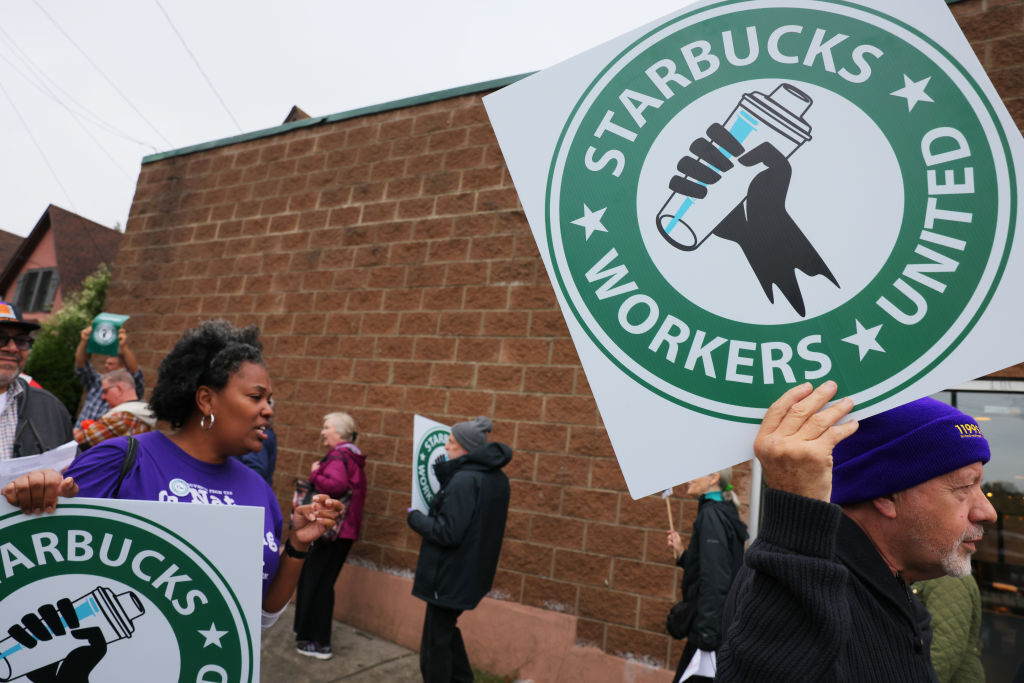- cross-posted to:
- [email protected]
- starbucks
- cross-posted to:
- [email protected]
- starbucks
I’m not sure why the Starbucks unionizing effort has excited me so much. I will never have the opportunity to join a union in my field with 100% certainty - but damn do I want to see them continue to bloody Starbucks’ nose!
Even if unionizing your current employment is uphill, you might still want to work somewhere else one day. It always makes sense to support whatever union is closest to your field by joining the union.
You will also likely benefit from others being unionised. F…i. when Starbucks needs to honor decent employment terms, everyone in the barista field will need to match it or fall behind on employing, because who the hell wants to apply for a job that pays less?
Union membership is good karma that way.
You will also likely benefit from others being unionised. F…i. when Starbucks needs to honor decent employment terms, everyone in the barista field will need to match it or fall behind on employing, because who the hell wants to apply for a job that pays less?
That raises a question I’ve been wondering about for a while: why do we keep hearing about unions for specific companies, and not “all baristas” (or even “all fast food workers,” for that matter)?
Gotta start somewhere. Other baraistas and fast food workers might look at what’s happening and decided to fight to unionize themselves. Just give it time
That’s very country specific and historical. It depends on how it was started hundreds of years ago and what laws were written back then.
Generally, the idea of union agreements is that working terms need to be introduced in agreement rather than forced by law.
The original intention was to not make the government decide wages and working hours, but instead to allow employer and employees to agree without interference from politics.
There are other more politically regulated ways to do it though.
F.i. France, which is known for strong protests, doesn’t actually have a high percentage of unionised workers. However, their laws make it mandatory for all companies to follow the union agreements. While this sounds great, it’s also the reason why they protest angrily every time something is changed, because the unions can’t control what the non-members do. So instead of negotiating, they end up fighting.
Another example of things being different is in Sweden and Finland where they have layered agreements, where any company registering to operate in a given sector is legally obliged to follow the agreement for that sector. The individual union agreements comes on top. Whenever the union agreements in a sector have the same terms, those terms are then risened to the sector agreement, that everyone has to follow. This is a good way to do it. They also introduced this models with experience from other countries first.
It’s extremely difficult to go back and change the way it’s done on this basic level. For a lot of countries it would be a radical constitutional change.
You are the only person I’ve seen ever (and consistently) abbreviate “for instance”
It always makes sense to support whatever union is closest to your field by joining the union.
Wait… Can you just, like, join a random union? I assumed you had to work in the same industry, at least.
Well yes sure you can, but i wouldn’t choose any random union. I’d choose the one that has (or has a chance of making) an agreement with the company I’m working at or in the field I have an interest in working in.
Say you’re an educated nurse but temporarily working as a retail assistant or unemployed or whatever. IMO it would still make the most sense to be a member of the nurse union if that’s where you want to work.
it has to be an actual union though. In Europe we have a bit of an issue with fake unions… basically companies pretending to offer the same service, but can’t make agreements. It can be difficult to see through the bullshit.
To me, it’s exciting because they’re showing success at one of the hardest workplaces to organizing labour. Starbucks Workers United seems to have everything going against them:
- employees are more likely than at other workplaces to be short/medium-term, so it might be hard to convince employees to think about the long-term
- each store have relatively few employees but they’re going up against one of the biggest corporations in the world
- Starbucks is general seen as a “pretty good job”, so it’s got to be hard to convince employees to not just accept whatever they’re offered.
Yet, they’re persisting!
I haven’t been tabs on the Star Bucks union but I am glad it hasn’t fizzled out yet.



